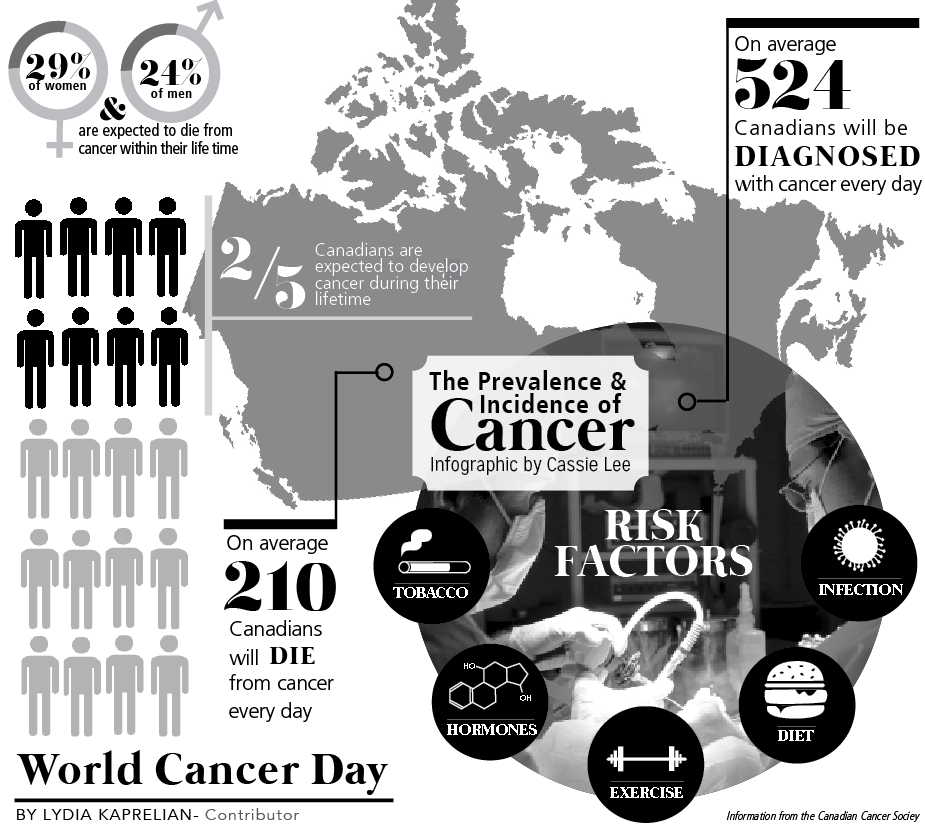With the combined efforts of the Cedars Cancer Foundation, Cedars CanSupport, and The Rosalind and Morris Goodman Cancer Research Centre, the third annual World Cancer Day was held in a fully packed amphitheater at the Montreal Neurological Hospital. The public forum focused mostly on palliative care—care for the terminally ill—with this year’s theme titled “How to Survive Cancer? Not Beyond Us.”
The night opened with a moving talk from two-time cancer survivor Tristin Williams. Despite undergoing multiple surgeries, a titanium hip replacement, and radiation therapy, Williams remains strong in the face of cancer.
“Living with cancer can be difficult, but with our life stories, we can inspire the minds of those who could lead us in the direction toward healing and could one day find a cure for this disease,” Williams said.
He urged the audience to observe a moment of silence for those who had lost their battle to cancer. The silence ended when Williams struck a drum, increasing the tempo and volume until the crowd joined in to clap with the beat. In a beautiful moment of harmony, Williams set the tone for the evening, calling on the audience to focus on the energy of survival.
Dr. Manuel Borod, an assistant professor of oncology at McGill, then introduced the Division of Supportive and Palliative Care at the McGill University Health Centre (MUHC), followed by the forum experts.
As the Director of Survivorship at MUHC, Dr. Gen Chaput highlighted the burgeoning need for survivorship care.
“Right now, there’s approximately one million cancer survivors in Canada,” Chaput explained. “By 2020, that number is expected to go to two million.”
Chaput’s presentation touched on developing research on ‘chemo brain’—that is, a brain’s function being altered due to chemotherapy, higher rates of sexual dysfunction, sleep disorders, anxiety, and depression among cancer survivors. With survivor rates increasing, Chaput emphasized that it is increasingly important to provide palliative care.
Afterwards, Dr. Jordi Perez, an anesthesiologist and cancer pain specialist, explained the importance and stigma behind cancer pain drugs. Perez aims, through his work, to provide targeted treatment to maximize effectiveness and minimize side effects.
Dr. Robert Kilgour, associate director of the McGill Nutrition and Performance Laboratory, gave a presentation on exercise and nutrition to conclude the World Cancer Day talks. Because cancer patients are immunocompromised, they need a clean environment to stay healthy. As part of his basic nutritional recommendations, Kilgour emphasized the importance of consuming calories and maintaining a healthy weight.
“People tend to cling to the new things in the news, the next miracle product,” Kilgour explained. “Our clinical nutritionists want to bring people back to the basics.”
Kilgour then highlighted the need for research in the developing field of exercise oncology. Common knowledge demonstrates the importance of regular physical activity for healthy people, but staying active is even more important for cancer patients.
“We do know […] that in specific subsets of cancer patients, you can see up to a 30 to 40 per cent risk reduction in breast cancer and colorectal cancer recurrence,” Kilgour said.
Staying physically active means that patients are less likely to have to wait for further treatments if the doctors fear the patient is too weak.
“There’s a very narrow window of time between diagnosis and the time they start treatment,” Kilgour explained. “As exercise scientists, we take advantage of any time period to help the patient become a stronger individual so that they can take chemotherapy and radiation therapy […] so that they’ll become a ‘better’ patient.”
The World Cancer Day presentations pointed to a more holistic sense of care to improve patients’ quality of life during and after treatment. Though many have lost their battle, the public forum cast a hopeful light onto the future of cancer care.
“Let us fight for all the individuals we have lost in the cancer community,” Williams urged. “They will never be forgotten. Let the impact that they have had on our lives give us the fuel to keep pushing forward.”








